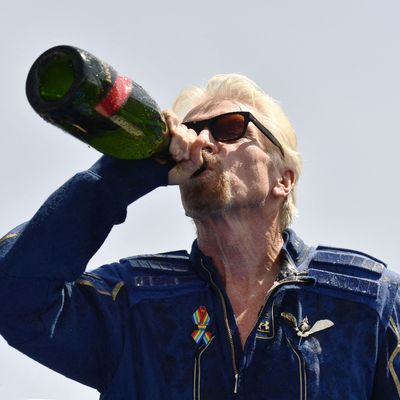
For Elon Musk, at least, space represents hope. Or so the billionaire implied on Twitter, in a self-serious attempt at poetry. “Those who attack space/maybe don’t realize that/space represents hope/for so many people,” he reflected. Perhaps Musk was dreaming of a way out of his current troubles: The Tesla founder was due back in court over shareholder allegations that he’d purchased his cousin’s company for more than it was technically worth. Unlike most of us, Musk can theoretically afford a flight to space, or the edge of it, as the means become available through companies such as his own SpaceX. Other billionaires have already beat him to the feat. Richard Branson recently nudged space in a trip aboard his company’s Virgin Galactic flight. Later this month, Jeff Bezos will do the same aboard his own Blue Origin.
Our space-faring billionaires are striving for common dreams. Who hasn’t looked up at night and wondered what awaits humanity there, in the dark? For most of us, space is an abstract idea, a place we can see but will never touch. Once the province of professional astronauts, space is opening up, but its promise remains an exclusive one. Earth, meanwhile, is set to spin on largely as it always has, which is no reason to celebrate.
Space might well represent hope for Musk, but most people have more immediate concerns, like the travails imposed by climate change. Almost 200 people died during the Pacific Northwest’s recent record-setting heat wave. That tragedy may be dwarfed by future heat waves and corresponding death tolls; what happened in the Pacific Northwest looks like a harbinger, and not an anomaly, as the Earth inexorably warms. Consider the scene: As Branson and Bezos prepared for their respective journeys to the edge of space, farm workers labored to save harvests from unbearable temperatures. At least one died, in Oregon.
A billionaire could say that the masses aren’t his special responsibility — and to an extent, he’d be right. He’s a private citizen, not a government by and for the people. Private individuals though they are, they’re capable of so much more than they’ve begrudgingly given us. They aren’t rushing to pay workers livable wages in safe conditions; many cheat the U.S. tax code. Rather than turn their attentions to causes at home, they look outward and upward, where no one waits to challenge them. (The condition of being a billionaire allows them little choice. Good luck finding one who didn’t build a fortune at the expense of the planet or the working class.) There’s a wishful thinking inherent to these almost-space flights not present in other forms of luxury travel. In each instance, billionaires turn their backs to a planet they helped consume and look outward to possibilities they haven’t ruined or taken for themselves. Space doesn’t quite belong to them, though it could, and they certainly seem to hope it will. It’s hard to blame them. In space, there are no shareholders to mollify, no labor laws to flout, no PR storms to suffer, not yet. Space is still an absence, a blank slate upon which someone like Musk can project their personal hopes.
It’s not wrong to dream of space, of new worlds and new opportunities. Nor is it wrong to reach for those worlds. Humanity would be poorer without such world-spanning ambition. Billionaires, however, aren’t really stretching out on our collective behalf. They’re grasping for themselves. So there’s an uncomfortable subtext to Branson’s recent journey, which captured public attention; thousands watched him ascend to heights that may be closed to everyone else for a long time and maybe for good. Billionaires such as Branson have been more than pleased to build and then hoard wealth at our expense. There’s no cause to expect him, or Bezos, or Musk, to democratize space any more than they’ve democratized prosperity. They won’t save us, and neither will the aliens. We’re on our own, and we have problems to solve right now.






























